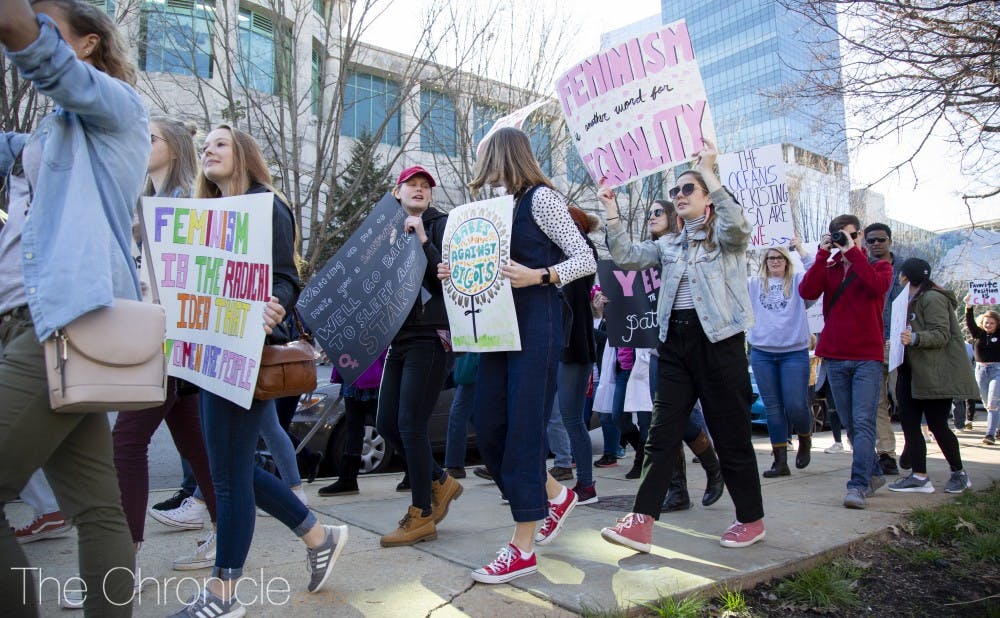Thousands gathered for the third annual Raleigh Women’s March, drawing together women of all ages and backgrounds.
Activists marched around the N.C. Legislative Building in downtown Raleigh, before convening on Halifax Mall for a line-up of speakers and performances Jan. 27. Women Mobilize NC—the ad hoc volunteer group that organized the march, which is not affiliated with the national Women's March organization—designated this year’s theme to be “Women United for Justice.”
Holding a watercolor painting of President Trump kicking down the Statue of Liberty, 68-year-old Liz Seaborn said that she created the artwork as commentary on the current administration.
"Everyone has a statue that they want to take down,” Seaborn said. “I’m here for the feeling of community. It’s reassuring to know that people feel the same way and want change.”
A group of three girls wearing silver face glitter told The Chronicle they had a similar reason for participating in the march.
“It’s hard to stay hopeful, so we’re marching to renew hope,” said 14-year-old Zari Emerson.
Amelia Posner-Hess, who marched alongside Emerson, was also at the march to support her mother, Beth Posner, an associate professor at the UNC School of Law, who was scheduled to speak at the event.
“She’s going to talk about Title IX,” Posner-Hess said. “She raised me to be a radical feminist.”
Participants expressed that the march represented more than just specific issues—it was also an opportunity for women of different generations to come together.
In hopes of passing down her commitment to grassroots activism, 64-year-old Mavin Stith shared that she brought her daughter and granddaughters to the march.
“I’m concerned about voting rights, job wage and the cost of being educated,” Stith said.
Kaylee Farmer, Stith’s 12-year-old granddaughter, said that she hoped for increased racial representation in politics.
“I want to see not only a woman, but a woman of color, a woman who looks like me,” Farmer said. “Someone who I can connect with, someone who started from the bottom.”
Stith added that minority visibility is not only necessary in elected offices, but also in activism events such as the Women’s March.
“We need more blacks to be more vocal and come out and fight,” Stith said. “They don’t think their voice[s] will be heard because they think the system has failed them.”
Among the event’s lineup of performers was the Raging Grannies, an activist organization of older-aged women who rewrite the lyrics of existing songs to advocate for social issues through their performances.
With “gaggles” in cities across the United States and Canada, the Raging Grannies dress in clothing that mocks stereotypes of older women, such as lace aprons, colorful boas and flower-embellished swinger hats.
Members from the Triangle sing in front of Sen. Thom Tillis’ office every Tuesday, focusing on lyrics that relate to feminism, the environment and economic justice.
“Women of a certain age who speak out get attention,” said Ann Wringland, a 75-year-old “granny.”
When asked about the requirements for joining the Raging Grannies, Wringland said that prospective members only need to be “willing to [be] outrageous.”
Duke students were also present at the Women’s March. Senior Shannon Malloy, a resident assistant in Crowell Quad, organized an event that brought 18 of her residents to the march.
“I know financial barriers limit the opportunities of many students to engage in these activities, so by planning it through [Housing and Residence Life], we were able to cover the costs of transportation and [have] three completely full vans of Duke students,” Malloy said.
Malloy added that she thought the march was a great experience for Duke students.
“It was so empowering and a great way for [students] to engage in topics they’re passionate about while getting to know each other better,” Malloy said. “I hope that we can continue to expand Duke’s presence at the Women’s March.”
Get The Chronicle straight to your inbox
Signup for our weekly newsletter. Cancel at any time.

